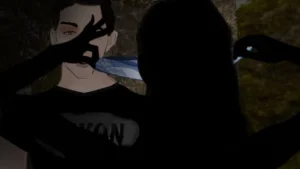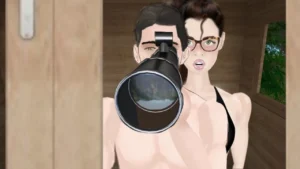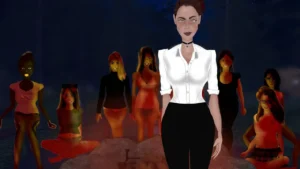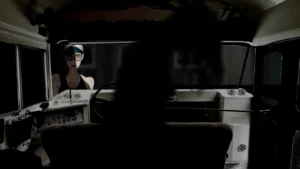
Camp Klondike
Play Camp Klondike
Camp Klondike review
Discover the unique blend of narrative depth, character relationships, and playful adventures in this standout visual novel
If you’re curious about Camp Klondike, you’re not alone—this visual novel has carved out a niche by blending summer camp nostalgia with mature storytelling and meaningful choices. Set at a wilderness retreat after the campers have gone home, the game invites you to step into the shoes of a counselor navigating friendships, flirtations, and personal growth. Unlike many titles in its genre, Camp Klondike stands out for its emphasis on character development, consent-driven interactions, and a trust/desire system that rewards thoughtful decisions. Whether you’re here for the story, the relationships, or the playful tension, this guide will help you make the most of your summer at Camp Klondike.
Camp Klondike Gameplay and Core Mechanics
How Does Camp Klondike Play? 🎮
So, you’ve arrived at Camp Klondike and you’re wondering what you’ve signed up for. Is it just clicking through text? Far from it! The core Camp Klondike gameplay is an immersive loop of exploration, interaction, and introspection. Your days are structured, giving you a comforting rhythm of morning announcements, scheduled activities, and free-time periods where the real magic happens.
Think of it less as reading a book and more as living a summer. You’ll navigate the camp map, choosing where to go and, most importantly, who to spend your precious time with. 🗺️ Every interaction is a chance to learn more about the colorful cast of characters, from the stoic archery instructor to the mischievous camper who’s always planning the next prank. The visual novel mechanics are beautifully complemented by mini-games—whether you’re trying to hit a bullseye, craft a friendship bracelet, or win a canoe race. Succeeding in these isn’t just for points; it can influence a character’s mood, opening up new, more vulnerable dialogue options later. It’s a brilliant way to make you feel like your skills, not just your words, impact the world.
I remember one playthrough where I spent the first few days focusing solely on building my canoeing skill. It felt a bit niche at the time, but that dedication paid off massively during a key story event where I could partner with a character who valued athletic prowess. It completely changed the dynamic of our relationship and unlocked a scene I hadn’t seen before. This is the beauty of the Camp Klondike gameplay—your hobbies and successes matter.
The Trust and Desire System: More Than Just Flirting 💖
This is where Camp Klondike truly shines and separates itself from the pack. Forget simple romance meters. The game introduces a nuanced trust desire system that tracks two separate, but often interconnected, aspects of your relationships.
Trust is the foundation. It’s built through being a good friend, keeping promises, offering emotional support, and showing genuine interest in a character’s struggles and dreams. A high Trust level means a character confides in you, seeks you out for advice, and considers you a true friend.
Desire, on the other hand, represents romantic or physical attraction. This is fueled by flirty dialogue, playful teasing, thoughtful gifts, and choosing activities that spark a more intimate connection. It’s about creating that summer spark. ✨
The real genius is that these two stats are not a single path. You can have a deep, platonic friendship with high Trust and low Desire. You can have a whirlwind, passionate fling with high Desire but lower Trust. Or, you can strive for the ultimate connection where both are high, creating a relationship built on both friendship and romance. The trust desire system ensures that every relationship you build is uniquely yours. I once pursued a route focused purely on Desire, and while the romantic scenes were thrilling, the ending felt hollow because we didn’t truly know each other. It was a powerful lesson in what makes a connection last.
Pro Tip: Pay close attention to character reactions. A line that builds Desire with one character might accidentally lower Trust with another. There are no universally “correct” choices, only what feels right for the relationship you want to build.
To help visualize how this works, here’s a breakdown of how these mechanics influence different character arcs:
| Character Archetype | How Trust is Built | How Desire is Built | Impact on Story |
|---|---|---|---|
| The Reserved Artist | Listening to their creative worries, respecting their need for space. | Sharing vulnerable art, quiet moments alone by the lake. | High Trust unlocks their secret portfolio; High Desire leads to a deeply personal portrait session. |
| The Energetic Jock | Being a reliable teammate, cheering them up after a loss. | Playful competition, daring activities, physical humor. | High Trust gets you named their “lucky charm”; High Desire unlocks a private, celebratory scene after a big win. |
| The Camp Counselor | Helping with duties, showing responsibility and maturity. | Subtle, mature flirting during late-night rounds, sharing personal stories. | High Trust allows them to break professional boundaries; High Desire leads to riskier, secret encounters. |
Branching Narratives and Meaningful Choices 🌳
If the trust desire system is the heart of the game, the branching narrative is its soul. Camp Klondike is not a story on rails. It’s a sprawling tree of possibilities where your meaningful choices genuinely carve your path. We’re not talking about an illusion of choice here; we’re talking about decisions that determine which scenes you see, which secrets are revealed, and ultimately, how your summer ends.
The game excels at giving weight to seemingly small decisions. Choosing to sit with one cabin at lunch over another can kick-start an entirely new friendship arc. Deciding whether to cover for a prank or tell the truth can permanently alter your standing with a whole group of campers. This branching narrative structure means that no two playthroughs are the same, offering incredible replay value. I’ve replayed the first three days four times, and each time I discovered new dialogue, new mini-events, and gained a deeper understanding of the camp’s social dynamics.
This approach is fundamental to the game’s handling of character relationships. The game respects your agency, allowing you to define what each relationship means. You can pursue a single love interest with determination, flirt with everyone for a chaotic summer, or focus entirely on building deep, platonic bonds. The story adapts to you.
Crucially, this all ties into one of the game’s most praised features: its handling of consent in games. Camp Klondike never forces you into an uncomfortable romantic or physical situation. Flirtatious advances from characters can be gently deflected without penalty to your overall relationship—your Trust might even increase as they respect your boundaries. Romantic scenes are often preceded by clear, dialogue-based check-ins, making the player an active participant. This thoughtful integration of consent in games makes the romantic payoffs feel earned and respectful, rather than transactional or predatory. It’s a benchmark for how these themes should be handled.
Here’s a look at how a single morning can branch out based on your meaningful choices:
8:00 AM – Breakfast in the Mess Hall
* Choice A: Sit with Alex, the aspiring writer.
* Outcome: You help them brainstorm for a short story. Trust with Alex increases.
* Choice B: Sit with Sam and Jordan, the camp troublemakers.
* Outcome: They recruit you for a prank on the camp director. Desire with Sam increases, but Trust with the Director decreases if you agree.
10:00 AM – Activity Period
* If you agreed to the prank: You spend the period secretly planning and executing it. This unlocks a unique, chaotic scene and can close off certain “responsible” story paths later.
* If you declined or sat with Alex: You attend your scheduled activity (e.g., Archery). Succeeding at the mini-game improves your skill and puts you in a positive mood, which can lead to special dialogue options during your next interaction.
1:00 PM – Free Time
* The consequences of your morning unfold. If the prank was discovered, you might be spending your free time in detention, leading to unique scenes with other characters who made similar choices. If you had a successful archery session, you might find the archery instructor is much more open to conversation, potentially raising both Trust and Desire.
This example shows just a tiny fragment of the branching narrative. Every day is a web of these meaningful choices, ensuring your story at Camp Klondike is truly your own. The Camp Klondike gameplay loop, powered by its unique systems, creates a summer you’ll want to relive again and again, discovering new secrets and forging new connections each time.
Camp Klondike stands out in the visual novel landscape by offering a summer camp adventure that’s as much about personal connections as it is about playful encounters. With its trust/desire system, branching narratives, and richly drawn characters, the game rewards players who invest in both the emotional and physical sides of relationships. Whether you’re here for the story, the strategy, or the nostalgia, there’s always something new to discover at Camp Klondike. Ready to start your own campfire legend? Dive in, make choices that feel true to you, and see where the summer takes you.
















